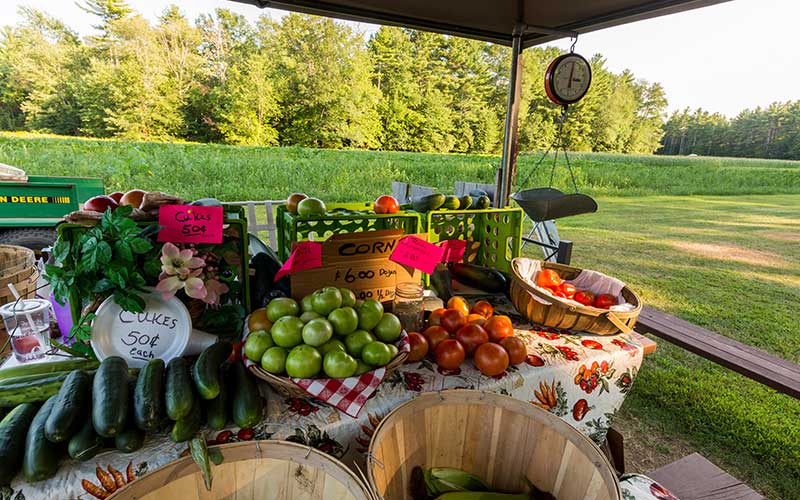
Maine lawmakers have made it easier for small farmers to get their products directly to your plate with passage of a food sovereignty law. Photo: EcoPhotography
Maine lawmakers have made it easier for small farmers to get their products directly to your plate with the recent passage of L.D. 725, “An Act to Recognize Local Control Regarding Food Systems.” This new “food sovereignty” law allows cities and towns to pass ordinances exempting local farmers and food producers from licensing and inspection regulations, so long as their food is sold locally, directly from producer to consumer. Twenty Maine cities and towns have already enacted such ordinances.
CLF supports this move by Maine, which will strengthen the local food movement here and create new opportunities for growth among small farmers and food producers. But we also caution that the new law raises important legal questions and has implications for food safety, because it removes certain levels of regulation designed to protect consumers like you and me.
The Pros and Cons of Food Sovereignty
The food sovereignty movement has been gaining considerable momentum in Maine in recent years. Proponents argue that local farmers and food producers should be allowed to sell their goods directly to consumers without having to comply with restrictive state and federal licensing, inspection, and food safety requirements. Complying with these regulations can create a significant financial burden for small farmers and producers, in particular. Those burdens, in turn, can severely hamper the growth and development of local agriculture, specifically small-scale farms.
This law aims to remove those burdens. Exempting local farmers from regulations may keep some small agricultural operations from being priced out of the market. Additionally, this law could reduce governmental interference in local agricultural affairs. One proponent recently articulated this notion succinctly: “If we can feed ourselves, no one can push us around.”
The benefits aren’t just for the farmers, however. By encouraging Mainers to buy local, the law could also help reduce the carbon footprint of the food we buy. Getting your food from down the road, rather than a grocery store that has shipped or flown produce from hundreds or even thousands of miles away, cuts carbon and air pollution from truck, train, and ship travel.
Food sovereignty laws are not immune to criticism, however. Many argue these laws create a health and safety risk to consumers. Federal and state inspection and licensing regulations, while costly to comply with and occasionally bogged down by red-tape, serve a critical purpose: namely, ensuring that the food we eat will not make us sick.
Each year, contaminated food sickens 48 million Americans and causes 3,000 deaths – and that’s despite all of the regulations and red tape. But the consistency and uniformity of state and federal food safety regulations may be lost as Maine moves to a more localized system of regulation.
Legal Questions Raised by Maine’s Food Sovereignty Law
Maine’s new food sovereignty law may face legal challenges under the Commerce Clause of the U.S. Constitution and the principles of federal and state preemption. The Commerce Clause gives Congress the power to regulate interstate commerce, including the safety of food products sold across state lines. When it comes to food produced and sold within state borders, the states have regulatory authority.
Local ordinances add another layer of regulation (or, in the case of food sovereignty laws, exemption from regulation). But under the doctrine of preemption, local laws must give way to state and federal laws when they are in conflict. If challenged by large farm operators or food safety advocates, a court may find Maine’s new food sovereignty law preempted by federal and/or state law.
In answering questions related to preemption, the specific language that each city or town uses in its food sovereignty ordinance will be crucial. Prior to the passage of L.D. 725, many towns, such as Blue Hill, already had such ordinances. In 2014, the Maine Supreme Judicial Court determined that Blue Hill’s ordinance did not raise preemption issues because it exempted local farmers only from municipal regulations, not from state and federal regulations.
The ordinance, though, could arguably be read to in fact exempt local producers from state and federal regulations as well. While the key provision in the ordinance simply states that local food producers are “exempt from licensure and inspection” without specifying from whom, the rest of the ordinance implies an intention to extend the exemption to state and federal regulations. While the Supreme Judicial Court held this was not enough to raise preemption issues, food sovereignty ordinances that explicitly exempt local food producers from federal and state regulations could be vulnerable to preemption challenges.
The Future of Food Sovereignty in Maine
Maine’s enactment of this food sovereignty law is an important development for the local food system in the state and its food producers. By giving small farmers and food producers easier access to their customer base – their neighbors – they may have a better chance of not only surviving, but thriving, along with Maine’s local food economy.
CLF will continue to monitor the local ordinances passed before and after the enactment of the law, as well as the impacts on local food producers. And, we’ll keep you up to date on other developments in the food sovereignty movement in Maine.



